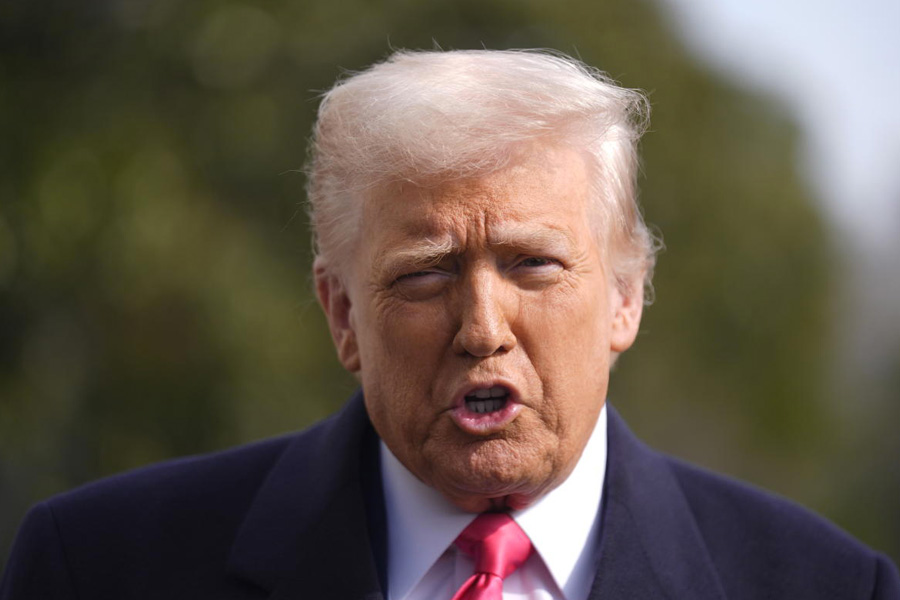US President Donald Trump has signed an order designating English as the official language of the US, the White House said on Saturday.
The order did not require any changes to federal programmes and appeared to be largely symbolic. But the pronouncement was the biggest victory yet for the country’s English-only movement, which has long been tied to efforts to restrict bilingual education and immigration to the US.
More than 30 states have already designated English as their official language.
“Establishing English as the official language will not only streamline communication but also reinforce shared national values, and create a more cohesive and efficient society,” the order said.
The executive order rescinds a Clinton-era mandate that required agencies and recipients of federal funding to provide language assistance to non-English speakers but allows agencies to keep current policies and provide documents and services in other languages.
While more than three-quarters of Americans speak only English at home, there are about 42 million Spanish speakers in the country and three million Chinese speakers.
Activists and advocacy groups are alarmed by what that will mean for non-English speakers when it comes to immigration, voter access and other issues.
The order will allow government agencies and organisations that receive federal funding to choose whether to continue to offer documents and services in languages other than English, according to a fact sheet. The move rescinds a mandate from former President Bill Clinton that required the government and organisations that received federal funding to provide language assistance to non-English speakers.
Designating English as the national language “promotes unity, establishes efficiency in government operations, and creates a pathway for civic engagement”, according to the White House. But some activists and organisations think the move is just another way for the President to stoke division and fear.
“This isn’t just an offensive gesture that sticks a thumb in the eye of millions of US citizens who speak other languages, but also will directly harm those who have previously relied on language assistance for vital information,” Vanessa Cárdenas, executive director of America’s Voice, an advocacy group for immigration reform, said in an email.
According to the International Institute for Democracy and Electoral Assistance, an official language is what is used by the government to conduct official, day-to-day business. Having one or more official languages can help define a nation’s character and the cultural identity of those who live in it.
Prioritising one language may place certain people in a position of power and exclude others whose language is not recognised, according to the institute.
US English, a group that advocates for making English the official language in the US, believes having an official language provides a common means of communication, encourages immigrants to learn English to use government services and “defines a much-needed common sense language policy”.
Currently there are more than 350 languages spoken in the US, according to US Census Bureau data. The most widely spoken languages other than English are Spanish, Chinese, Tagalog, Vietnamese and Arabic.
People in the US also speak native North American languages such as Navajo, Yupik, Dakota, Apache, Keres and Cherokee, among others.
Anabel Mendoza, the communications director for United We Dream, a non-profit immigrant advocacy organisation, said limiting the language of federal communication will make it harder for people to become citizens if they are denied the ability to speak their native tongue throughout the process. Currently, people of certain age and residency requirements can qualify for a waiver to do the citizenship test and interview in their native language.
“Trump is trying to send the message that if you’re not white, rich and speak English you don’t belong here,” Mendoza said. “Let me be clear: Immigrants are here to stay. No matter how hard Trump tries, he can’t erase us.”
The Congressional Hispanic Caucus announced on Friday that New York Rep. Adriano Espaillat, caucus chair, will deliver, on behalf of Democrats, the official Spanish-language response to Trump’s upcoming joint address to Congress.
George Carrillo, co-founder & CEO of the Hispanic Construction Council, said it seems like a step backwards in a country that has championed its diversity. He is also concerned how limiting governmental communication might affect US territories such as Puerto Rico where the predominant language is Spanish.
“This executive order, while framed as promoting unity, risks dismantling critical supports like ESL programmes and multilingual resources that help immigrants adapt and contribute,” Carrillo said. “Imagine families navigating healthcare or legal systems without materials in a language they understand, it’s a barrier, not a bridge.”
APIAVote, a nonpartisan nonprofit focused on registering Asian American and Pacific Islander voters, also expressed worry by saying this could mean barriers for millions of voters such as naturalised citizens or elderly residents who aren’t English-proficient.
“It will make it harder for them to participate civically and vote, as well as access critical healthcare, economic and education resources,” the group said in a statement.
New York Times News Service and AP











